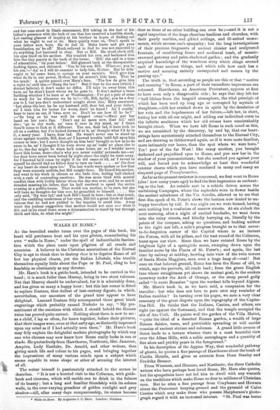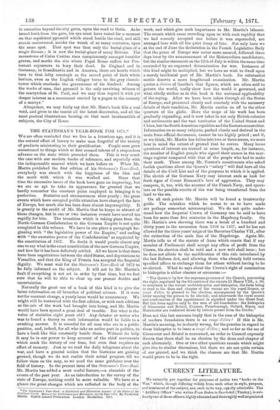WALKS IN ROME.*
As the travelled reader turns over the pages of this book, his heart will perchance beat and his eyes glisten, remembering his own " walks in Rome," under the spell of indescribable fascina- tion which the place casts upon pilgrims of all creeds and countries. A believer in the Christian associations of the Eternal City is apt to think that to destroy these is to deprive Rome of all but her physical charm, yet the Italian Liberals, who trouble themselves equally little about the Pope or St. Paul, cling to her headship as obstinately as any devotee.
Mr. Hare's book is a guide-book, intended to be carried in the hand ; it is much fuller than Murray, being in two stout volumes. Not that Murray should be undervalued, for it is admirably done, and has given us many a happy hour ; but this last corner is fitted to replace Eustace, that dullest of last-century digests, in which, nevertheless, our ancestors of the grand tour appear to have delighted. Learned Eustace fitly accompanied those great black engravings which probably caused Niebuhr to say, " My pre- sentiment of the emotions with which I should behold the Roman ruins has proved quite correct. Nothing about them. is new to me : as a child, I lay so often, for hours together, before their pictures, that their images were, even at that early age, as distinctly impressed upon my mind as if I had actually seen them." Mr. Hare's book may fitly explain the delightful modern photographs by which any one who chooses may now know how Rome really looks in sun or shade. He quotes freely from Hawthorne, Northcote, Mrs. Jameson, Ampere, Lady Eastlake, Dr. Arnold, and other writers, thus giving much life and colour to his pages, and bringing together the impressions of many various minds upon a subject which seems capable in some shape or other of arousing the interest of all.
The writer himself is passionately attached to the scenes he describes. " It is not a hurried visit to the Coliseum, with guide- book and cicerone, which will enable one to drink in the fulness of its beauty ; but a long and familiar friendship with its solemn walls, in the ever-varying grandeur of golden sunlight and grey shadow—till, after many days companionship, its stones become
• Walks in Rome. By Augustus J. C. Hare. London : Strahan.
dear as those of no other building can ever be ;—and it is not a rapid inspection of the huge cheerless basilicas and churches, with their gaudy marbles, and gilded ceilings, and ill-suited monu- ments, which arouses one's sympathy ; but the long investigations of their precious fragments of ancient cloister and sculptured fountain, of mouldering fresco and mediaeval tomb, of mosaic- crowned gateway and palm-shadowed garden ; and the gradually acquired knowledge of the wondrous story which clings around each of these ancient things, and which tells how each has a motive and meaning entirely unsuspected and unseen by the passing eye."
The truth is, that according as people see this or that " motive and meaning" in Rome, a part of their immediate impressions are coloured. Hawthorne, an American Protestant, appears at first to have seen only a disagreeable side ; he says that they left her "half lifeless from the languid atmosphere, the vital principle of which has been used up long ago or corrupted by myriads of slaughters,—left her crushed down in spirit by the desolation of her ruin and the hopelessness of her future,—left her, in short, hating her with all our might, and adding our individual curse to the infinite anathema which her old crimes have unmistakably brought about. When we have left Rome in such mood as this, we are astonished by the discovery, by and by, that our heart- strings have mysteriously attached themselves to the Eternal City, and are drawing us thitherward again, as if it were more familiar, more intimately our home, than the spot where we were born." Yes ! poet of the far West ! like many another, you brought darkened and prejudiced eyes to Rome, and you saw her in the shadow of your preconvictions ; but she couched you against your will, and forced you to acknowledge at least that wonderful exterior charm which you have rendered in many and many an eloquent page of Transformation.
As far as the present reviewer is concerned, we first went to Rome (alas! how many years ago) to find the first impression as enchant- ing as the last. An outside seat in a vehicle driven across the undulating Campagna, where the asphodels were in flower beside the ancient milestones of the Via Aurelia, allowed us to see that first dim speck of St. Peter's above the horizon now denied to un- happy travellers by rail. It was night ere we were housed, having seen nothing but a confusion of narrow streets. At six o'clock the next morning, after a night of excited headache, we went down into the rainy streets, and blindly hurrying on, literally by the points of the compass, asking no questions, and looking neither to the right nor left, a mile's progress brought us to that never- to-be-forgotten corner of the Capitol where in an instant the Forum, with all its pillars, and the vast round of the Coliseum, burst upon our view. Since then we have entered Rome by the brightest light of a springtide moon, sweeping down upon the familiar scene by the Piazza of St. Peter's ; and again, the last time by railway at midday, bowling into view of the twin towers- of Santa Maria Maggiore, seen over a huge heap of—coal! But once on that beloved ground, Rome has been the Rome of old, to which, says the proverb, all roads lead ; from the green English lane whose straightness yet shows its ancient goal, to the sunken causeway under the Arch of Orange, or the steep paved gully called " la route Romaine " upon the verdant hills beyond Algiers.
Mr. Hare's book is, as we have said, a companion for the traveller ; but who does not love to pore over any reminder of Italian rambles ? In turning over his pages, we note a very clear summary of the great dispute upon the topography of the Capito- line Hill. lie thinks that the Italians, Canina, and others, are right (as against the Germans), and that the temple occupied the site of Ara Coeli. He paints well the garden of the Villa Mattel, " quite the ideal of a deserted Roman garden, a wealth of large Roman daisies, roses, and periwinkle spreading at will amidst remains of ancient statues and columns. A grand little avenue of ilexes leads to a terrace whence there is a most beautiful view over the Alban Hills, with a noble sarcophagus and a quantity of fine aloes and prickly pears in the foreground."
In his description of the Appian Way, that wonderful pathway of ghosts, he quotes a fine passage of Hawthorne about the tomb of Cecilia Metella, and gives us extracts from Dean Stanley and Fredrika Bremer.
From Wiseman, and Hemans, and Northcote, the three Catholie writers who have perhaps best loved Rome, Mr. Hare also quote*, but his sympathies have not led him to dwell with any warmth on the traditions which make Rome so dear to millions of Christian men. But he cites a fine passage from Conybeare and Howson about the Protestant burying-ground and the pyramid of Caius Cestius which may make those who possess Macpherson's photo- graph regard it with an increased interest. " St. Paul was borne to execution beyond the city gates, upon the road to Ostia. As he issued forth from the gate, his eye must have rested for a moment on that sepulchral pyramid which stood beside the road, and still stands unshattered, amidst the wreck of so many centuries, upon the same spot. That spot was then only the burial-place of a single Roman ; it is now the burial-place of many Britons. The mausoleum of Caius Cestius rises conspicuously amongst humbler graves, and marks the site where Papal Rome suffers her Pro- testant sojourners to bury their dead. In England and in -Germany, in Scandinavia and in America, there are hearts which turn to that lofty cenotaph as the sacred point of their whole horizon, even as the English villager turns to the grey church- tower which overlooks the gravestones of his kindred. Among the works of man, that pyramid is the only surviving witness of the martyrdom of St. Paul, and we may thus regard it with yet -deeper interest as a monument erected by a pagan to the memory of a martyr."
Altogether, we may fairly say that Mr. Hare's book fills a real void, and gives to the tourist all the latest discoveries, and all the most poetical illustrations bearing on that most inexhaustible of subjects, the City of Rome.































 Previous page
Previous page